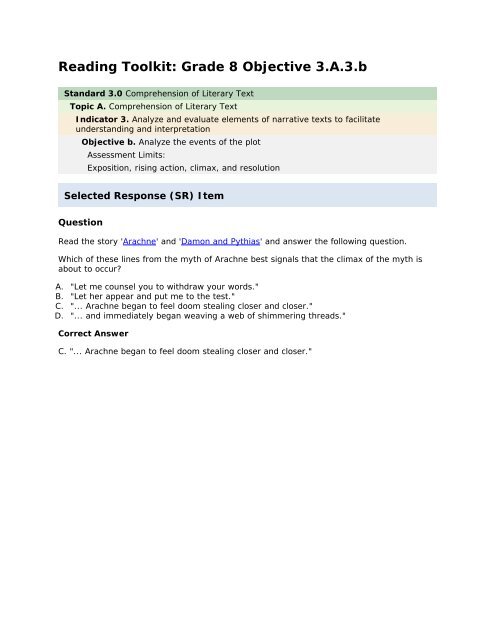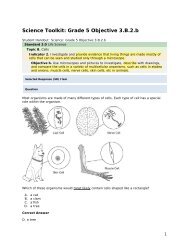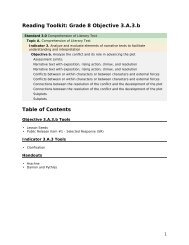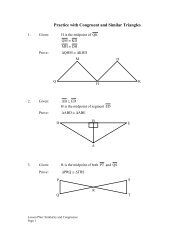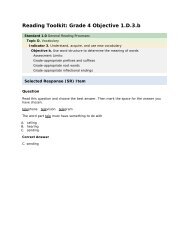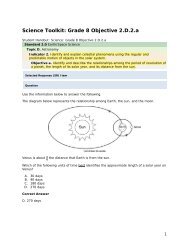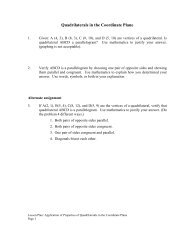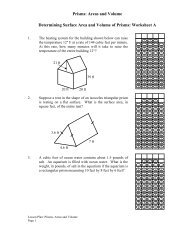Create successful ePaper yourself
Turn your PDF publications into a flip-book with our unique Google optimized e-Paper software.
<strong>Reading</strong> Toolkit: Grade 8 Objective <strong>3.A.3.b</strong><br />
Standard 3.0 Comprehension of Literary Text<br />
Topic A. Comprehension of Literary Text<br />
Indicator 3. Analyze and evaluate elements of narrative texts to facilitate<br />
understanding and interpretation<br />
Objective b. Analyze the events of the plot<br />
Assessment Limits:<br />
Exposition, rising action, climax, and resolution<br />
Selected Response (SR) Item<br />
Question<br />
Read the story 'Arachne' and 'Damon and Pythias' and answer the following question.<br />
Which of these lines from the myth of Arachne best signals that the climax of the myth is<br />
about to occur?<br />
A. "Let me counsel you to withdraw your words."<br />
B. "Let her appear and put me to the test."<br />
C. "... Arachne began to feel doom stealing closer and closer."<br />
D. "... and immediately began weaving a web of shimmering threads."<br />
Correct Answer<br />
C. "... Arachne began to feel doom stealing closer and closer."
Student Handout: <strong>Reading</strong>: Grade 8 Objective <strong>3.A.3.b</strong><br />
Question<br />
Read the story 'Arachne' and 'Damon and Pythias' and answer the following question.<br />
Which of these lines from the myth of Arachne best signals that the climax of the myth is<br />
about to occur?<br />
A. "Let me counsel you to withdraw your words."<br />
B. "Let her appear and put me to the test."<br />
C. "... Arachne began to feel doom stealing closer and closer."<br />
D. "... and immediately began weaving a web of shimmering threads."
Student Handout: <strong>Reading</strong>: Grade 8 Objective <strong>3.A.3.b</strong><br />
Handouts<br />
Many modern words have their roots in Greek Myths. The story of Arachne and her<br />
challenge to the goddess Athena reveals the basis for spiders being called arachnids.<br />
Arachne<br />
by Max J. Herzberg<br />
On another occasion Athena contested 1 for honors with a mortal.<br />
This mortal was Arachne. Her father was Idmon, skilled in the art of<br />
dyeing in purple, and from infancy the girl had been taught her<br />
father's art, joined with that of weaving. In all the land there was<br />
none that surpassed her. So conceited did she become that, lifting<br />
her head proudly to the skies, she challenged Athena herself,<br />
patron of the arts of the household, to compete with her.<br />
Pallas Athena had watched the progress that Arachne was<br />
making, and when she heard the presumptuous challenge, she<br />
assumed the guise of an old woman and came to the spindle at<br />
which Arachne was weaving.<br />
"I am," she said, "a woman old in experience, and I have seen<br />
much in this wide world. To me has come the knowledge of your<br />
challenge to Athena. Let me counsel you to withdraw your words.<br />
You surpass and shall surpass all other mortals, but how vain and<br />
foolish it is to contend with the immortal gods, from whom comes<br />
all skill!"<br />
"Be silent, foolish old woman," replied Arachne scornfully. "I fear<br />
not Athena, but shall put her to shame with my skill. Let her appear<br />
and put me to the test."<br />
Even as she spoke, Athena threw off her disguise and in solemn majesty stood before the<br />
girl.<br />
"Athena is here," she said; and at her words Arachne trembled and realized too late how<br />
insane had been her challenge. But she summoned up her courage and began to weave her<br />
most skillful web. She wove the web in all colors, but mostly in the royal purple of which her<br />
father was the master. At last her work was complete.<br />
Then Athena began to weave, and she depicted wondrous scenes in high Olympus, and<br />
from her very web floated forth divine fragrance of nectar and ambrosia. An unearthly<br />
beauty hovered over the design. In the corner Athena pictured the fate that had come to<br />
mortals who had defied the gods, and as she went from one to the other Arachne began to<br />
feel doom stealing closer and closer. As the last corner was completed, Athena turned to<br />
her, touched her with her magic spindle, and said:<br />
"Punished shall you be for your presumption, but the gods will not let die such skill as<br />
you have shown. Change to an insect, that other mortals may take warning from you, but<br />
ever weave a web of marvelous design."
Student Handout: <strong>Reading</strong>: Grade 8 Objective <strong>3.A.3.b</strong><br />
At the words of Athena, Arachne began to shrink and shrivel. Shortly she was completely<br />
transformed. Where a girl had stood an insect crawled—the spider; and before the eyes of<br />
the terrified beholders it scuttled off to a corner and immediately began weaving a web of<br />
shimmering threads. To this day the Greeks call the spider "arachne."<br />
1 Contested—competed
Student Handout: <strong>Reading</strong>: Grade 8 Objective <strong>3.A.3.b</strong><br />
Damon and Pythias<br />
By Max J. Herzberg<br />
It is likely that these men actually existed.<br />
According to the story, they were subjects of the<br />
tyrant Dionysius, who ruled over Syracuse in Sicily<br />
during the fifth century. Both Damon and Pythias<br />
were renowned for their wisdom and goodness, but<br />
in some manner of which there is no record, Pythias<br />
incurred the anger of the tyrant and was condemned<br />
by him to death. He bore the sentence bravely, but<br />
he asked Dionysius to grant him one<br />
favor—permission to go home and settle his affairs.<br />
Damon offered to be a hostage for the safe return of<br />
his friend.<br />
The tyrant agreed to let Pythias go.<br />
"But you must be here by such and such an<br />
hour," he warned him, "or your friend will die for<br />
you."<br />
Pythias set out for his home, which was a<br />
considerable distance away. He settled his affairs,<br />
divided his goods among his kinsfolk, and set out on<br />
his way back to Syracuse. Unfortunately, however,<br />
he was delayed at every turn. First it was a river swollen with floods that he had to ford,<br />
and then a tremendous storm made the road impassable. He struggled on desperately, and<br />
reached Syracuse in the very nick of time, for the executioner was already lifting up his<br />
sword to behead Damon. Pythias forced his way through the spectators, and cried out:<br />
"Hold your sword! Here I am!" and knelt down to receive the blow. But Dionysius was so<br />
filled with astonishment and admiration at the loyalty of the friends that he pardoned<br />
Pythias, and even asked that he might be admitted to his and Damon's friendship.


